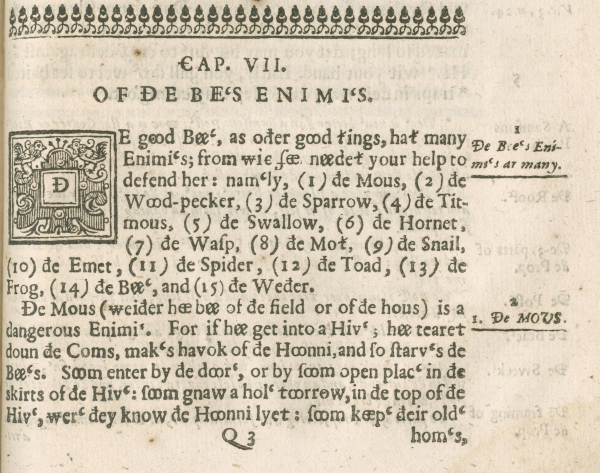Read more about what makes the language used in Charles Butler's ‘Nature of Bees’ so intriguing.

I’ve recently been creating some space in our basement strongroom, in order to give more of our books the air-conditioned, chilled lifestyle that they deserve. One of the items I’ve just moved into this new home, in an Oxford edition published in 1634, is by Charles Butler and bears the deceptively simple spine title ‘Nature of Bees’. Glancing inside, curious to find out what was the buzz (sorry) in 17th century beekeeping, I was both flummoxed and intrigued by the language I found:
“… if dou wilt hav de favour of dy Bee’s dat dey sting dee not, dou must avoid suc tings as offend dem … dou must not coom among dem smelling of sweat, or having a stinking bret”
[A bee’s] “tung is of dat lengt, dat hir mout cannot hold it, but being dubbled between hir Fangs under her cin, it reacet to de nek”
“De good bee, as oder good tings, hat many Enimis; from wic see needet your help to defend her”
Pardon? For a moment I wondered whether the author – possibly a resident of Ye London Manor of Hoxton – was experimenting with an Olde-Worlde English / Jafaican mashup long before such tings were fashionable, or whether I’d stumbled on some sort of proto-txtspk, 350 years before the invention of texting. However, a pencil note on the flyleaf, added by a helpful former librarian, pointed me in the right direction:
“Spelling based on same author’s ‘The English Grammar; or, the Institution of Letters, Syllables and Woords in the English Tung’”
This led me to investigate further, and discover that Butler, Vicar of Wootton St Lawrence, was both an early advocate of English spelling reform and sufficiently expert in apiculture to be referred to as “the father of British beekeeping”. The book in our collection, ‘The Feminin’ Monarchi’; or, The Histori of Bee’s…’, to give it its full title, was an opportunity for Butler to combine his two interests: it had first been published as early as 1609, but when Butler produced his ‘English Grammar’ in 1633, with its proposals for a phonetic alphabet for English, he immediately set about translating his popular bee book into his new system, resulting in our edition from the following year.
Butler sets out his orthography in a footnote, “De Printer to De Reader” (you get the idea by now), in which he explains how tiny dashes through letters such as ‘S’, ‘C’ and ‘T’ – dashes which become much more noticeable when you return to the text after reading this note – signify “simple Consonants with de aspiration H”. In the quotes above, for example, this transforms “suc” to “such”, “cin” to “chin” and “reacet” to “reacheth”. The ‘D’s beginning words such as “de” and “dat” also have dashes through them – these seem to work in the same way as the ‘Eth’ (Ð, ð ) which was used in Old English, and which survives to this day in the Icelandic language. Silent ‘E’s, meanwhile, are denoted by a small inverted comma.
Once you get the hang of the language and notation, the book makes for fascinating reading – it contains, for example, the first correct observations on how bees produce beeswax, and on how workers are female and drones male (no comments from my office colleagues here, please…). Now I’ve taken a look myself, I’ll be putting ‘The Feminin Monarchi’ safely back in our Rare Book Room, but will be happy to dig it out again for the interest and amusement of our Library readers. Meanwhile, I’ll continue with my stock moves, which will take a good while, but which will ultimately improve the preservation profile of our collections – rare books, as Butler wrote of his beloved bees, are best treated with respect, and “Der is no dealing wit dem but by patienc”.

